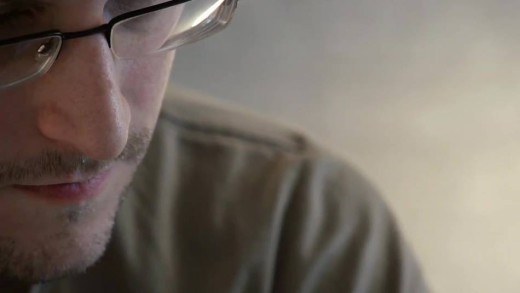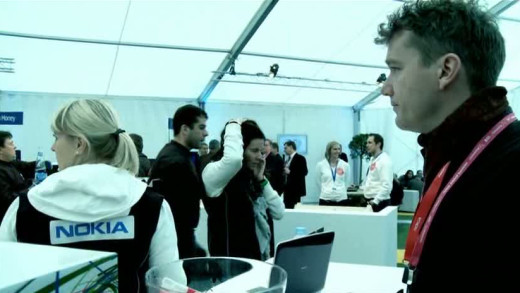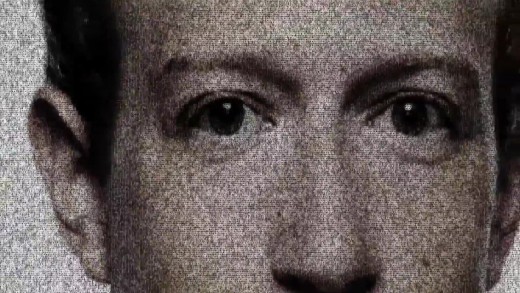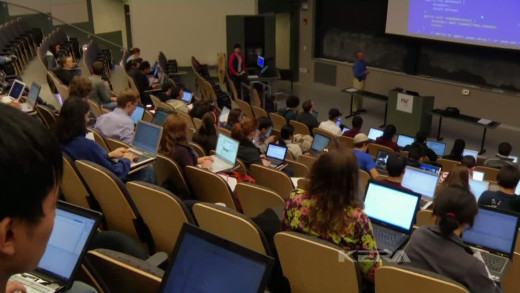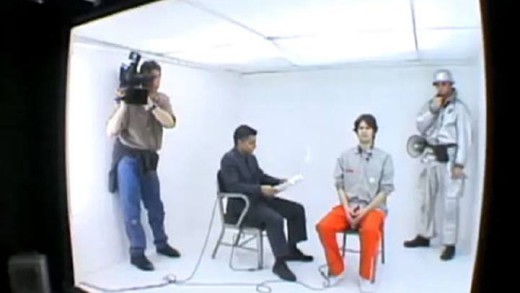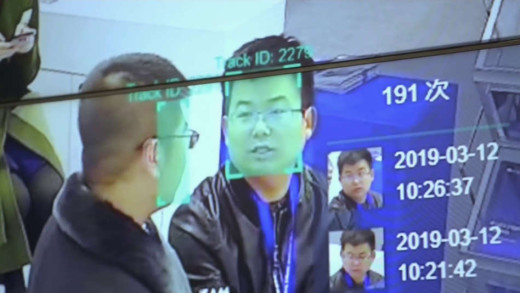Nerds 2.0.1: A Brief History of the Internet is a documentary series written and hosted by Mark Stephens under the pseudonym Robert X. Cringely as a sequel to Triumph of the Nerds. The series follows on by documenting the development of ARPANET, the Internet, the World Wide Web and the resulting dot-com bubble of the mid and late 1990s...
Citizenfour
In January 2013, film-maker Laura Poitras received an encrypted e-mail from a stranger who called himself Citizen Four. In it, he offered her inside information about illegal wiretapping practices of the NSA and other intelligence agencies. Poitras had already been working for several years on a film about mass surveillance programs in the United States, and so in June 2013, she went to Hong Kong with her camera for the first meeting with the stranger, who identified himself as Edward Snowden. She was met there by investigative journalist Glenn Greenwald and The Guardian intelligence reporter Ewen MacAskill. Several other meetings followed. Citizenfour is based on the recordings from these meetings. What follows is the largest confirmations of mass surveillance using official documents themselves, the world has never seen...
Modern society loves mobile phones -- the selection between different models and gadgets has never been bigger. But the production of this technology has a hidden, dark, bloody side. The main minerals used to produce mobile phones are coming from the mines in the Eastern DR Congo. The Western World is buying these minerals up at a furious rate, financing a bloody civil war which, during the last 15 years, has cost the lives of more than 5 million people. Blood In The Mobile explains the connections between mobile phones and the civil war in the Congo, while technology corporations whitewash the issue to "supply and demand" and claim ignorance...
Facebook is an enormously powerful corporation, harnessing both the self-disclosed and gleaned personal data of over 2 billion people. Its user-base is larger than the population of any country. The company is all pervasive online, tracking and profiling users and non-users alike. Cracking the Code looks at the insides of this giant machine and how Facebook turns your thoughts and behaviours into profits--whether you like it or not. And it's not just a one-way transaction either. Cracking the Code also explains how Facebook uses vast troves of web data to manipulate the way you think and feel, as well as act--all in the sole interests of Facebook, masquerading as "community." What are the social implications of this--when one company basically controls the insights and experiences of the entire online world, with extremely personalised and targeted social and behavioural engineering on a scale never before seen?
Truth in Numbers? Everything, According to Wikipedia explores the cultural implications and background of one of the most visited and referenced sites on the Internet. What is the role and impact of Wikipedia in the archiving of information and the preservation of culture? What will it leave behind? This film examines the unfolding legacy by weaving multiple perspectives about the impact of Wikipedia and provoking a deeper conversation on how knowledge is formed and what future generations will learn about history and the world...
Physician and mother of two Dr. Delaney Ruston became interested in how much screen time is too much when her preteen started begging for a smartphone. Ruston saw other parents equally confused on how to balance technology with a young developing mind, so she decided to delve into the science behind screen time to understand how it affects young people's minds and development. Through personal stories and input from leading researchers, the result is Screenagers, a film that sheds light on the impact screen time is having on kids; exploring how learning, playing, and socialising online effects teens' developing attention span, fragile self-esteem, and moral instincts. Screenagers examines the real risks of failing in school, social isolation, and digital addiction. It also explores solutions to handle screen time and provides parents with tools to help young people develop self-control and find balance in their digital lives, rather than rapid-fire thumbs and a six-second attention span.
Within a single generation, digital media, the Internet and the World Wide Web have transformed virtually every aspect of modern culture, from the way we learn and work to the ways in which we socialise and even conduct war. But is technology moving faster than we can adapt to it? Is our constantly-wired-world causing us to lose as much as we’ve apparently gained? In Digital Nation, Douglas Rushkoff and Rachel Dretzin explore what it means to be human in a 21st-century digital world...
The Internet's Own Boy is a biographical documentary of the programmer and activist Aaron Swartz, who died at age 26. From his help in the development of the basic Internet protocol RSS at age 14, to the co-founding of the social network website Reddit in 2006, Swartz becomes disillusioned with the grooming of academia to the corporate life presented to him, and turns instead to work on issues of sociology, civic awareness and activism. It then becomes Swartz's work in social justice issues and political organising, combined with an open and sharing approach to information access that ensnares him in a two year legal battle, in which authorities seek to make an example of him and the work. The battle sadly ends with Swartz taking his own life. This film is a personal story about what we lose when we are tone deaf about technology and its relationship to the political system, civil liberties and human relationships.
Blood Coltan travels to eastern Congo, where a bloody war is happening over a precious metal called Coltan—a raw material used in electronic devices such as computers, televisions and mobile phones. The demand for Coltan is driven by the west, funding the war in Congo between rebel militias and children as young as ten who work the mines hunting for this precious material of the technocratic age...
Every day, billions of people are unwittingly taking part in what is the largest most comprehensive psychological experiment ever conducted. The old marketing and advertising world using billboards, advertisements and TV commercials to persuade us, has been comprehensively augmented by an entirely new field of "user experience architects" and "online persuasion agents." These forces are given tremendous power from the proliferation of digital technologies. So how do these powerful forces ensure that we fill our online shopping carts to the brim, or stay on websites as long as possible? Or vote for a particular candidate? What Makes You Click examines how these prolific entities collectively and individually use, shape, and manipulate our experiences via an online world, not just when it comes to buying things, but also with regards to our free time and political perspectives. The manipulation has become so good that these powerful controllers, former Google employees among them, are themselves arguing for the introduction of an ethical code. What does it mean when the grand conductors of these huge experiments themselves are asking for their power, influence and possibilities to be restricted?
Admit it--you don't really read the endless pages of terms and conditions connected to every website you visit or phone call that you make do you? Of course not. But every day billion-dollar corporations are learning more about your interests, your friends and family, your finances, and your secrets--precisely because of this; and are not only selling the information to the highest bidder, but freely sharing it with the government. And you agreed to all of it. With plenty of recent real-world examples, Terms And Conditions May Apply covers just a little of what governments and corporations are legally taking from Internet users every day--turning the future of both privacy and civil liberties into serious question. From whistleblowers and investigative journalists to zombie fan clubs and Egyptian dissidents, this film demonstrates how all of us online have incrementally opted-in to a real-time surveillance state, click by click.
Can't Get You Out of My Head: An Emotional History of the Modern World is a six-part series that explores how modern society has arrived to the strange place it is today. The series traverses themes of love, power, money, corruption, the ghosts of empire, the history of China, opium and opioids, the strange roots of modern conspiracy theories, and the history of Artificial Intelligence and surveillance. The series deals with the rise of individualism and populism throughout history, and the failures of a wide range of resistance movements throughout time and various countries, pointing to how revolution has been subsumed in various ways by spectacle and culture, because of the way power has been forgotten or given away.
Google or Wikipedia? Those of us who search online are getting referred more and more to Wikipedia. For the past two years, this free online “encyclopaedia of the people” has been topping the lists of the world’s most popular websites. But do we really know what we’re using? The Truth According To Wikipedia plunges into the story behind Wikipedia and explores the powerful world of ‘Web 2.0’ -- Is it a revolution, or pure hype?
Heavy Metal
For more then twenty years, many hundreds of tons of electronic waste--or e-waste--from all around the world has been transported to an infamous Chinese town called Fengjang, just south of Shanghai, for disposal and so-called 'recycling.' Around 50,000 migrant workers constitute part of the massive workforce necessary to dispose of e-waste, with the downcycling component of the operations involving cutting, splitting, and salvage--most-often with rudimentary equipment. The workers toil endlessly to process almost 2 million tons of garbage every year, bearing incredible precariousness, and even putting in danger their own health due to the simply unacceptable working conditions and also the toxic characteristics of the metals, chemicals and materials they're handling. As the recognisable heaps of waste continue to pile up, Heavy Metal provides a moving image of a worldwide consumer society and the stark direct impacts of an 'invisible' waste.
As high-technology permeates further into the industrialised world, manufacturers will go to any lengths to get the raw materials to make their gadgets. Coltan from the Congo is one such rare ingredient. Few in the west know where their gadgets come from and that in the middle of Africa much human suffering is created in the pursuit of "technological advancement"...
We live in a world of screens. The average adult spends the majority of their waking hours in front of some sort of screen or device. We're enthralled, we're addicted to these machines. How did we get here? Who benefits? What are the cumulative impacts on people, society and the environment? What may come next if this culture is left unchecked, to its end trajectory, and is that what we want? Stare Into The Lights My Pretties investigates these questions with an urge to return to the real physical world, to form a critical view of technological escalation driven rapacious and pervasive corporate interest. Covering themes of addiction, privacy, surveillance, information manipulation, behaviour modification and social control, the film lays the foundations as to why we may feel like we're sleeprunning into some dystopian nightmare with the machines at the helm. Because we are, if we don't seriously avert our eyes to stop this culture from destroying what is left of the real world.
This film explores what affect the web is having on our society, as seen through the eyes of "the greatest Internet pioneer you've never heard of." Josh Harris--often called the "Andy Warhol of the Web"--founded a website during the renowned dot-com boom of the 1990s which was the world's first Internet television network. This concept was way ahead of its time. Using this platform, before broadband, a vision of that future was exemplified at an underground bunker in New York City where over 100 people lived together completely on camera, non-stop and unedited for 30 days over the millennium. These happenings, documented through We Live In Public, serve as a powerful analogy for the Internet as it's now known today and the price we pay for living in its 'public.' It shows the costs of willingly trading privacy and sanity for a constant voracious audience, attention, and the pursuit of celebrity, in an online world of pervasive surveillance.
AI, or Artificial Intelligence, is spouted as the ability of machines to "think" [sic] at a speed and depth far beyond the capacity of any human. Proponents of these digital technologies claim their systems are used in ways that are beneficial for society. But as we see, the current use of AI isn't necessarily aligned with the goals of building a better society. There still remain escalating concerns about labour, the future of work, privacy, the surveillance society, and social control--all valid criticisms that go back many decades--while the rivalry for technological supremacy between the United States and China mirrors the dynamics of the cold war. In the Age of AI is an investigation that touches on these areas, providing a platform to ask fundamental questions about unrestrained technological escalation.
Film-maker Brett Gaylor explores the issues of copyright in the information age, mashing up the media landscape of the 20th century and shattering the wall between users and producers. The film's central protagonist is Girl Talk—a mash-up musician topping the charts with his sample-based songs. But is Girl Talk a paragon of people power or the Pied Piper of piracy?
With the pervasive screen environment, our memory is dissipating. Hard drives only last five years; webpages are forever changing in the way of the Ministry of Truth; and there's no machine left that reads 15-year old floppy disks. Digital data is vulnerable. Yet entire libraries of books and other physical artifacts of information and culture are being lost due to budget cuts, or even the shifting assumption that everything can be found online, and can always be in the digital realm. How is this untrue? For the first time in history, we have the technological means to save great swathes of data about our past, yet it seems to be going up in smoke already. Will we suffer from collective amnesia in the age of decline?
The Net explores the back-story of Ted Kaczynski (the infamous 'Unabomber') as a prism to the often unexamined side of the history of the Internet. The film combines travelogue and investigative journalism to trace contrasting counter-cultural responses to the so-called 'cybernetic' revolution of the 1970s. For some whom resist the pervasive systems of digital technology, the Unabomber can come to symbolise an ultimate figure of refusal. But for those that embrace the technologies, as did and do the champions of so-called 'media art', such as Marshall McLuhan, Nam June Paik and Stewart Brand, the promises of worldwide networking and instantaneous communication outweigh any and all of the concerns. The Net links these multiple nodes of cultural and political history, analogous to the Internet itself. Circling through themes of utopianism, anarchism, terrorism, the CIA, LSD, MKULTRA, Timothy Leary, Ken Kesey and the Merry Pranksters, The Net exposes the conspiracies and upheavals, secrets and cover-ups as part of the forgotten subversive history of the Internet.
"Quants" are the mathematicians, software developers and computer programmers at the centre of the global economy. These are the people who designed the "complex financial products" that caused the financial crisis of 2008. Here they speak openly about their game of huge profits, and how the global economy has become increasingly dependent on mathematical models that quantify commodified human behaviours to the point of insanity. But things don't stop there. Through the convergence of economy and technology, the Quants have now brought this model into the world of the machines, where trades are done at the speed of light, far from the realm of human experience. The machines are in charge. Some Quants are even now worried. What are the risks of this complex machine? Will the Quants be able to keep control of this financial system, or have they created a monster?
InRealLife
InRealLife asks: What exactly is the Internet and what is it doing to our children? Taking us on a journey ranging from the bedrooms of British teenagers to the explosive world of Silicon Valley, filmmaker Beeban Kidron suggests that rather than the promise of free and open connectivity, young people are increasingly ensnared in a commercial world. And as this is explained, InRealLife asks if we can afford to stand by while our children, trapped in their 24/7 connectivity, are being outsourced to the web.
Millions of people around the world are finding work by-the-job online. The "gig economy" is worth more than $5 trillion worldwide, and seemingly growing. But who are these workers? Seduced by the promise of independence, and control over their working hours and income, people around the world that are lured into the gig economy now face the harsh reality of it algorithmically-driven market place: dangerous working conditions, instability, and the precariousness of their work that can stop overnight in the case of deactivation or a bad review. Through committed characters, The Gig is Up shows that the so-called 'freedom' that is espoused by this technological economy is only an illusion.
The Intelligence Revolution is an extolling and largely non-critical account by advocate Michio Kaku who unflinchingly explains how artificial intelligence will "revolutionise homes, workplaces and lifestyles," and how virtual worlds will apparently become "so realistic" that they will "rival" the real physical world. Robots with "human-level intelligence" may finally become a reality according to Kaku, and in the ultimate stage of scientific mastery, the era of control imperative and domination, this culture will seek to merge human minds with so-called machine intelligence. Also, for the first time, we see how a severely depressed person can be turned into a happy person at the push of a button—all thanks to the convergence of neuroscience and microtechnology. What's wrong with such developments? And the larger culture such that technologies like this are being developed in the first place? How do such prospects impact the real physical world and the real physical lives of all of us?
Unprecedented looks at voting irregularities in the controversial presidential election in the United States from the year 2000. With a focus on the swing state of Florida, the recount, the ensuing supreme court decision in December, and future elections; the film also shows how fundamentally, many people--the majority being African-American--have outright been refused the ability to vote by a clever mix of legalese, electronic voting machines, political maneuvering and simple racism. A 1868 law prevented felons from voting--originally crafted to keep blacks from the polls in the wake of the Civil War--was resurrected in 2000, used to create a computerised list of people supposedly illegible to vote. The list had weird parameters and included as many as 57,000 to 91,000 non-felons; overwhelmingly targeting people of colour. On election day, these people were turned away at the polls. The role of electronic voting machines is also examined, as they are totally unaccountable and do not allow audits. The argument is made because of copyright over the software and trademarks. The machines also do not give paper receipts, so there is no physical evidence in case of the need for a recount. How does the United States--the so-called and self-proclaimed world-famous democracy--fair as one in light of this?
Centred around the concept of open computer networks that contradictorily end up running closed corporate-controlled communication portals like Facebook and Twitter, Free The Network follows two young men who camp out at Zuccotti Park building wireless access points to connect their devices as part of the 'Occupy movement.' Through interviews along the way, Free The Network examines the current state of the Internet in the midst of the protest, and shows how the myth of the 'democratisation of technology,' along with the widespread emergence of clicktivism, is a flawed framework for driving social and political change...
There are billions of people increasingly glued to 'smartphones' and consumed by the seemingly endless spectacle of 'social media.' But why? Reporter Hilary Andersson seeks to answer this question by tracking down insiders who reveal how social-media companies have deliberately developed habit-forming technology to get people addicted. Former Facebook manager, Sandy Parakilas, tells us the "goal is to addict you and then sell your time." Likewise, Leah Pearlman, the co-creator of the renowned 'Like' button, warns of the dangers of social-media addiction. Through these voices, and many others, Andersson shows how behavioural science is profoundly used by tech companies to keep people endlessly checking their phones, to the end of huge profits.

